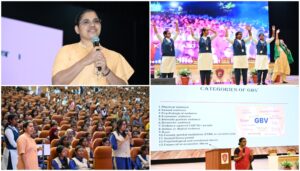
Patna: Children raised by working mothers are displaying stronger life skills, emotional resilience, and leadership potential, according to a new study by the International Labour Organization (ILO). The research highlights how daughters of employed women exhibit 40% more confidence and are significantly more likely to succeed in their careers—particularly in managerial and decision-making roles.
The study supports a growing body of evidence suggesting that working mothers positively influence their children’s development. A 2024 report by India’s Ministry of Labour also notes that children of working women show a marked improvement in time management, self-reliance and leadership abilities, often becoming more responsible at an earlier age.
“These children are growing up with a better understanding of balance, responsibility, and gender equality,” the report states. Sons of working mothers, for instance, are more likely to participate in household duties and support family members—an observation echoed by a study from the American Psychological Association.
In urban areas, the trend is even more pronounced. Research by the State Council of Educational Research and Training (SCERT) in 2003 found that 78% of children of working mothers regularly care for younger siblings and help with domestic chores, reflecting a shift in family dynamics where shared responsibilities are becoming more common.
India’s Labour Force Gender Gap
Despite these positive trends, India still faces significant disparities in female labour force participation. The national average stands at 27.2%, with 32.8% of rural women and 21.1% of urban women engaged in formal work. States like Chhattisgarh (38.9%), Himachal Pradesh, and Mizoram lead the country in female workforce participation, while Bihar (8.4%) and Uttar Pradesh (11.5%) remain at the bottom of the list, according to the National Sample Survey (2024).
Experts suggest that the low participation rates in Bihar and Uttar Pradesh reflect deep-rooted socio-cultural barriers and a lack of accessible employment opportunities for women.
Raising a More Equitable Generation
The ILO study makes a compelling case for encouraging women’s participation in the workforce—not just as a driver of economic growth, but also as a catalyst for social change. The findings show that children of working mothers are more emotionally aware, better decision-makers, and more equipped to navigate challenges.
“These are children who grow up watching resilience in action,” says a researcher involved in the study. “They internalise those values and emerge stronger, more empathetic, and more capable.”
As India debates policies around gender equality and economic empowerment, the message is clear: when women work, families—and future generations—thrive.





